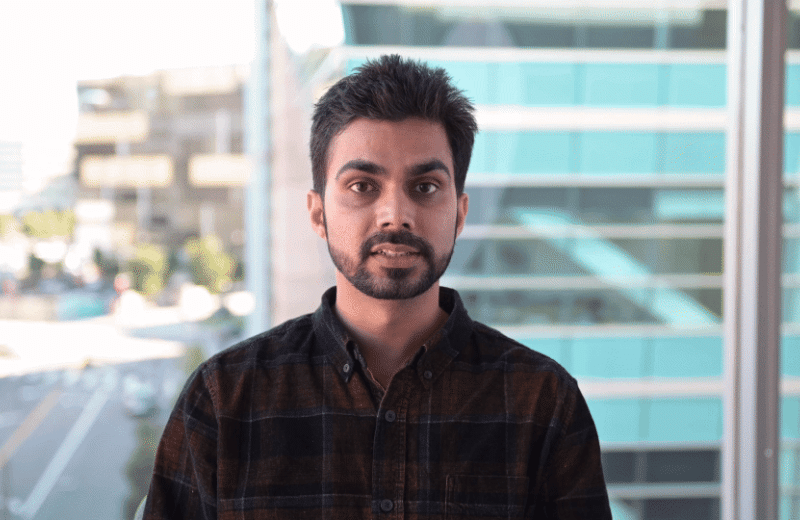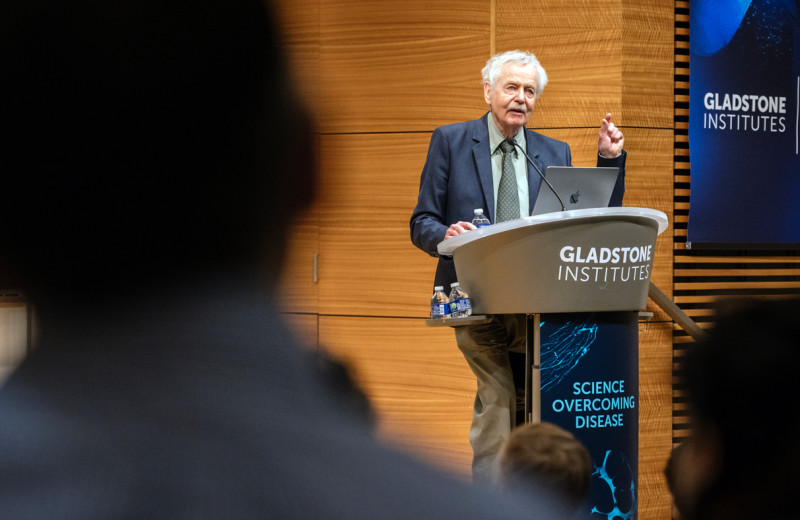Gladstone NOW: The Campaign Join Us on the Journey✕

Kazutoshi, known by his colleagues as Kazu, is a staff research investigator in Shinya Yamanaka’s laboratory. He obtained a PhD in biological sciences from the Nara Institute of Science and Technology in Japan and completed his postdoctoral training at Kyoto University.
Kazu was the postdoctoral scholar in Shinya Yamanaka’s laboratory who helped him discover induced pluripotent stem cells and revolutionize the field of biology. Still working together more than a decade later, Kazu talks about Shinya’s influence and reveals some of own his hidden talents, such as blind sake tasting. To learn about Kazu’s work, read about a recent discovery he made with his colleagues that answered lingering questions about cellular reprogramming.
What brought you to Gladstone?
In 2014, I had my own research group in Japan. Everything was going well except for one thing. Unfortunately, I could not find enough time to do experiments myself. This was frustrating because I love conducting experiments. Shinya Yamanaka understood me very well and gave me an opportunity to join his lab at Gladstone. I have spent 3 years here and enjoy living a postdoc-like life.
What do you like about Gladstone?
Everyone is very friendly and well organized. They know what they should do and what they need. I feel that everything at Gladstone is intended to make scientists comfortable. That’s why, to be honest, I don’t want to imagine ever leaving.
Were you interested in science as a child?
Not really. But I grew up in a small town in the mountains surrounded by nature. Every day after school, I would enter a bush or forest to discover treasures, such as beetles, frog eggs, and so on. These experiences in my childhood probably influenced my decision to become a scientist.
Why did you decide to go to graduate school?
I did not think about my future seriously when I was an undergraduate student. On the other hand, I had a vague notion that I wanted to have a creative job, so I decided to go to graduate school where I might get a chance to do that.
What or who influenced your decision to work in science?
Because I have worked with Shinya for about 18 years, my research style may be heavily tinged with Yamanaka-ism. Actually, he has taught me a lot. The most important thing I learned from him is that impactful science can be born from seemingly negative or unexpected data. And, when I come up with brilliant logic, it is often an idea that anyone can think of.
What do you do when you are not working?
I usually spend time playing with my son. He is very honest, very active, and very curious. I should live the same way he does.
If you could learn to do anything, what would it be?
My favorite thing other than science is drinking beer. Japanese beer is excellent, but doesn’t come in many varieties. In the San Francisco Bay Area, I can easily find many different types of beer. Someday, I would like to brew my own beer.
What is your hidden/unique talent?
I won a competition of blind sake tasting several years ago, so I may have an acute sense of taste. However, because I always have a stuffy nose in San Francisco, it is just an old glory.
Name one thing that not many people know about you.
Without a doubt, it would be my contribution to the discovery of induced pluripotent stem cells (iPSCs). But I hope this might change as time goes on.
If you could meet any scientist from any point in time, who would it be and why?
If I can only choose one, I would like to meet Robert Hooke who is known for many scientific achievements, including a principle of physics called Hooke’s law. Notably, he is known as the first person who observed a structure like a small room in biological organisms using a microscope, and termed it a “cell.” If possible, I would like to show him living cells using a modern microscope and hear his impressions.
Want to Join the Team?
Our people are our most important asset. We offer a wide array of career opportunities both in our administrative offices and in our labs.
Explore CareersMeet Gladstone: Shyam Jinagal
Meet Gladstone: Shyam Jinagal
Shyam Jinagal explores how genetics, aging, and regeneration shape the heart—and how those insights could one day restore heart function after injury.
Graduate Students and Postdocs Profile Cardiovascular Disease Srivastava LabA Sculptor of Modern Regenerative Medicine
A Sculptor of Modern Regenerative Medicine
Among his myriad accomplishments, Rudolf Jaenisch—winner of the 2025 Ogawa-Yamanaka Stem Cell Prize—was the first to demonstrate the potential of induced pluripotent stem cells to treat disease.
Awards Ogawa Stem Cell Prize Profile Regenerative Medicine Stem Cells/iPSCsMeet Gladstone: Shijie Wang
Meet Gladstone: Shijie Wang
Shijie Wang, a postdoctoral scholar in Steve Finkbeiner’s lab, uses artificial intelligence, robotics, and stem cell technologies to uncover how brain cells die in neurodegenerative diseases like Alzheimer’s and Parkinson’s.
Profile Neurological Disease Finkbeiner Lab AI Robotic Microscopy



